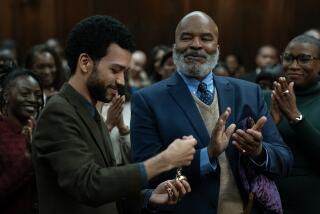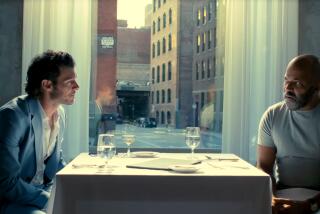Critic’s Pick: TV Picks: Ricky Jay, Tom Edison, ‘Justified,’ ‘Masterchef Junior’
“American Masters: Deceptive Practice: The Mysteries and Mentors of Ricky Jay” (PBS, Friday); “American Experience: Edison” (PBS, Tuesday). Two films about magicians, transformation and the impossible made real.
Ricky Jay is the first magician to be given the “American Masters” treatment, a press release would like you to know. But as the show’s full title suggests, Jay remains mysterious in the piece and (prestidigitator that he is) largely directs your attention elsewhere, to the magicians who made him: Slydini, Cardini, Francis Carlyle, Al Flosso (the Coney Island Fakir), Dai Vernon, Charles Miller and, most significant perhaps, his grandfather Max Katz, an amateur magician of high standing who was his living introduction to some of these deceptively ordinary-looking men. There is no attempt to put his own work in the context of contemporary magic, or the wide world of illusionism, or harvest comments from colleagues, competitors or followers of his own -- what he means to or how he compares to David Copperfield or David Blaine, Penn and/or Teller. Apart from his business partner, magician Michael Weber, whom he also accounts a kind of late-life mentor, younger magicians are invisible, “this ongoing continuum of sleight of hand” notwithstanding. He’s like an embodied metaphor for an art that is both necessarily public and highly veiled.
A historian as well as a practitioner of the art, Jay looks mostly toward the past: “I know absolutely nothing about the 20th century,” he says, “and I’m not just talking about magic.” With his rough skin, bearded chin, long hair and hulking frame, he has always seemed dangerous beneath the patter (his first book, of many, was called “Cards as Weapons”); it’s no accident he wound up in several David Mamet films and “Deadwood.” The film feels a bit ragtag at times, as if it were a project that had been started and stopped and picked up again and polished at some time later, maybe by another person, but it is always lively and fascinating and astonishing -- not least in the way that illusions remain undetectable on screen, too fast for even the fixed, undistractible eye of the camera. Even when others merely describe Jay’s work -- a journalist remembers him materializing a block of ice behind a menu at a table where they were having lunch -- the effect is thrilling.
Thomas Edison, that inventor-hero of the late 19th and early 20th centuries, was called the Wizard of Menlo Park; indeed, in the combination of talent, obsession and patient persistence that made him, he was very like a magician. And though his illusions (a talking machine, an electric light, a moving picture) were real enough, and now seemingly as natural to the world as rocks and trees and rain, that they were astonishing in their time is brought fully to life by “Edison,” the latest installment in the PBS series “American Experience.” (Thinker, tinkerer, celebrity, pitchman, he was an American experience all on his own.) The photographic and documentary record of his life, works and time is substantial, and as well-shot historians appear to tell the tale, the film makes vivid a time and place where time and space were being technologically compacted, as railroads made transcontinental travel the work of a few days, and transcontinental communication the work of seconds, and electric light beat back the night. Animations made from his original sketches and plans are charming. Edison’s projects didn’t always bear mechanical fruit, and though the failure of an idea bothered him not at all, in the real world he was competitive sometimes to a self-blinding fault -- he ran what amounted to a smear campaign against alternating current (because the math was too hard for him, it’s suggested) and thought that projecting motion pictures onto a screen was a mug’s idea. But it’s still his picture in the dictionary next to “inventor.” (I am speaking metaphorically, as far as I know.)
“Justified” (FX, Tuesdays). Many commentators considered last season’s “Justified,” not for the first time in its life, a failure, or at least a falling off for a series that regularly seemed to punch above its weight. Some simply could not get past Michael Rapaport’s Southern accent. I wasn’t bothered -- I mean, I still love “Mary Poppins,” Dick Van Dyke and all, and this wasn’t nearly that. I found the season was largely of a piece with earlier ones, in tone and entertainment value -- with some great work by season regular Alicia Witt -- and the narrative prelude to the current year, the series’ self-imposed last. (The regular ensemble, led by charm-faucet Timothy Olyphant as deputy U.S. marshal Raylan Givens -- insouciance is his super-power -- is always excellent, with the warming effect of well-made comfort food.)
Now the critical word on the street (the world on the critical street?) is that we are seeing “Justified” redux; and it is certainly true that, with the endgame afoot, the series feels a little more serious and focused, getting down to business and brass tacks (though still fun, in the presiding spirit of Elmore Leonard). Destinies will be fulfilled; fates forestalled by the promise of future seasons will come to fruition. And while it’s still impossible to tell even what this year’s story will be about, if past seasons are anything to go by, some people will end up dead before the final credits finally roll. That it might turn out to be Raylan is a possibility the season premiere already put out out there; in any case, someone you like is bound to be hurt, especially given that the villains might be numbered among them: Walton Goggins’ Boyd Crow, Raylan’s longtime nemesis, is as much a protagonist as anyone onscreen, weirdly sympathetic in spite of his being a demonstrably bad dude. (At this point, he’s also a partner in the series’ signal romance, with Joelle Carter’s Ava Crowder, also an old flame of Raylan’s -- it’s complicated out there in Harlan, Ky.) Mary Steenburgen is back as an icy gangstress; sexy septuagenarian Sam Elliott will have something to do on the wrong side of the law; and Garret Dillahunt comes on board as this season’s psycho with an elaborate way of speech, practically a tradition in these here parts.
“MasterChef Junior” (Fox, Tuesdays). I suppose it’s my desire to see this show run all the time for as long as I live that makes it such a regular visitor to this spot. We are in Season 3 now, airing hot on the heels of Season 2, and we can see certain patterns and types emerging. This year’s pie-in-the-judges’ faces was last year’s syrup-on-the-judges’ heads; Gordon Ramsay’s mother stunt-guesting last year this season becomes a gag in which the judges were prosthetically aged into their future selves. (They are sweetly game for these things.) This year’s Andrew is last year’s Samuel -- the advanced older kid touted as a front-runner, not least in his own mind, whose ego seems dangerously enmeshed in both the cooking and the contest. The spirit of Abby, last year’s pint-sized eccentric, is present both in the hyperactive Cory and the perennially dazed Riley -- who also has in him a dash of Logan, last season’s bow-tied winner. As always, what these kids accomplish seems impossible in a way that, say, the work of musical prodigies or brilliant child actors does not, because it is so outside our range of experience, and of expectation -- which is that kids like pizza, and also pizza -- and because we know as well that the narratives of reality TV are less than completely reliable. (See Buzzfeed food writer Emily Fleischaker’s evocative, informative, as-behind-the-scenes-as-she-could-get report for some facts of the matter, and a journalistic good time.) But beyond the boilerplate doubts, I’m a believer; what’s completely reliable is that this thing works.
Robert Lloyd tweets in a bad Southern accent @LATimesTVLloyd
More to Read
The complete guide to home viewing
Get Screen Gab for everything about the TV shows and streaming movies everyone’s talking about.
You may occasionally receive promotional content from the Los Angeles Times.







